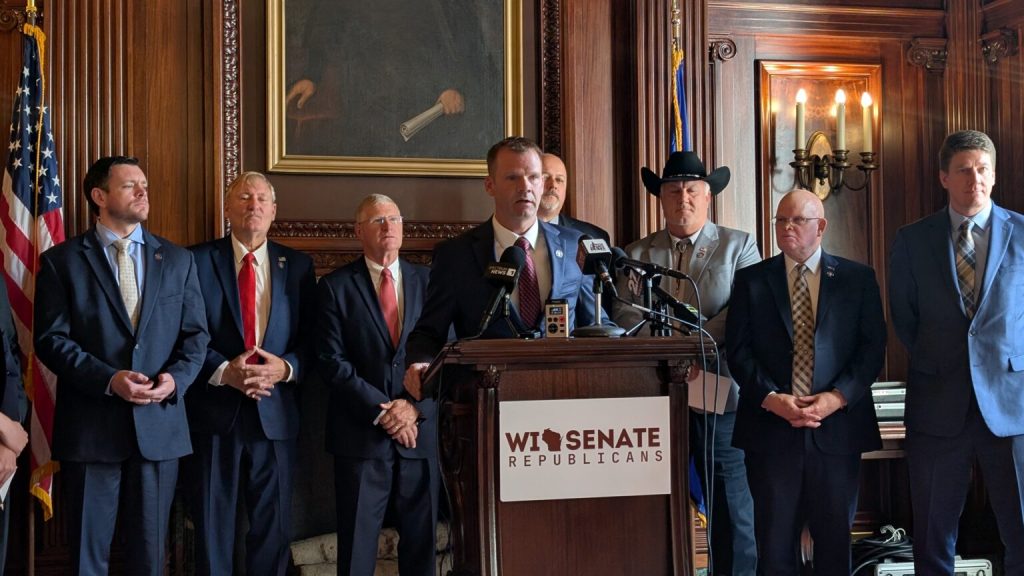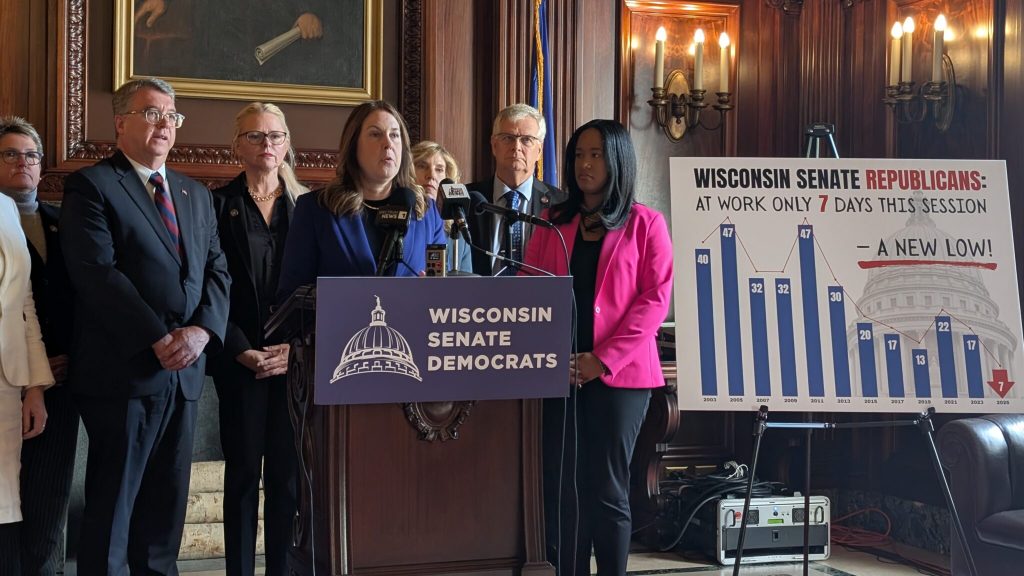Senate Approves School Cellphone Ban
Senate also passes bill require insurance coverage of breast cancer screenings.

“All they do is critique process and complain about things,” Senate Majority Leader Devin LeMahieu said of his Democratic colleagues. “But we’re getting bills done.” (Baylor Spears/Wisconsin Examiner)
The Wisconsin State Senate met for a floor session for the first time in over 90 days, advancing bills that would ban cellphones in schools, require coverage of breast cancer screenings for women at high risk and allow candidates to remove themselves from ballots.
“We are feeling the effects of the big, ugly bill on our families, our farmers and our neighbors who need food assistance or who are covered by Medicaid,” Senate Minority Leader Dianne Hesselbein (D-Middleton) said at a press conference. She was referencing the federal law approved over the summer that made cuts to the SNAP and Medicaid programs to help pay for tax cuts. “So what is the Republican agenda today? Nothing that addresses any of those concerns. The fact that some Republicans are here at all in this building is pretty unusual.”
The Democrats displayed a poster that showed the number of times the Senate has met per legislative session from 2003 to 2025. Tuesday was the first time the Senate has been on the floor since July, when lawmakers passed the current state budget.

Democrats displayed a poster that showed the number of times the Senate has met per legislative session from 2003 to 2025. (Baylor Spears/Wisconsin Examiner)
During the current two-year session, the Senate has held seven floor sessions. In 2019, the Senate met 13 times on the floor.
“We are on the path to become one of the least active state Senates in Wisconsin’s history. It’s irresponsible and reckless, but this is the Republican majority,” Sen. Dora Drake (D-Milwaukee) said, adding that Tuesday also marks the 14th day of the federal government shutdown.
“Congressional Republicans are refusing to extend Affordable Care Act subsidies that would prevent Wisconsinites from seeing their monthly insurance premiums doubled next year,” Drake said. “There is not one item on our calendar today aimed at making health care more affordable for Wisconsinites or to lower costs for Wisconsin families.”
Senate Majority Leader Devin LeMahieu (R-Oostburg) said that compared to the Assembly, the Senate typically takes up a larger schedule of bills when it comes in. The Assembly has met three times this fall.
“All they do is critique process and complain about things,” LeMahieu said of his Democratic colleagues. “But we’re getting bills done.”
LeMahieu added that the Senate is going to meet in November, January, February and March before the end of the legislative session. Legislators will “keep looking at different things” to address gaps caused by the federal government shutdown, he added.
Cellphone ban bill
The Senate voted 29-4 to concur in a bill that will require school districts across the state to adopt a cellphone ban policy. The four opposing votes came from Democrats.
Under AB 2, school districts’ policies would need to ban cellphones during instructional times. School boards would be required to implement the new policy by July 2026 and would need to include exceptions for emergencies, for educational purposes and cases involving student health care, individualized education plans (IEPs) or 504 plans (learning environment accommodations).
“These are devices that are taking away from our kids’ learning, and folks are asking us to do something about it,” Sen. Rachael Cabral-Guevara (R-Appleton) said at a press conference ahead of the session.
“Wisconsin wants this. Wisconsin is asking for this,” Cabral-Guevara said on the floor.
According to NPR, at least 31 states and Washington D.C. had adopted a cellphone ban as of September.
According to a recent Wisconsin Policy Forum report, cellphone policies vary widely across the state, though most school districts already restrict student cellphone usage to common areas.
Sen. Melissa Ratcliff (D-Cottage Grove) listed a number of concerns about the bill, including whether the bill would impede parents’ ability to communicate with their children when there are safety concerns and would hinder local control.
“Why are we, the state, worried about taking away kids’ cellphones before we enact legislation that prevents kids from having access to guns and prevents mass shootings?” Ratcliff asked. “While I understand the intent behind this bill, which is to reduce distraction in the classroom, we cannot ignore the profound and tragic reality of our current times. This measure, though well-meaning, would be a dangerous step backward in ensuring the immediate safety of our children, especially in the wake of recent horrific shootings.”
Cabral Guevara noted that the bill includes an exception for emergencies.
The bill passed the Assembly in February, so it will now go to Evers’ desk.
Lawmakers also concurred in AB 5, which would implement new requirements for allowing residents to inspect textbooks, curriculum or instructional materials.
Wisconsinites currently have the ability to submit open records requests to school districts to receive school materials. Under the bill, school districts would need to comply with requests within 14 days and textbooks would need to be listed online.
This is the third session where lawmakers have pursued this policy. The 2023-25 version of the bill passed the Assembly, but never received a vote in the Senate. The 2021-23 version was vetoed by Evers.
The current iteration of the bill passed the Assembly earlier this year.
Breast cancer screening coverage
Lawmaker advanced a bill that would require health insurance policies to provide coverage for diagnostic breast examinations and for supplemental breast screening examinations for an individual who has dense breast tissue. It would require that coverage include no patient cost-sharing.
The bill, SB 264, passed 32-1. Sen. Chris Kapenga (R-Delafield) was the lone opposing vote.
Cabral-Guevara said she started work on the bill when a constituent of hers, Gail Zeamer, came to her about the issue. Previous versions have failed two times before.
Zeamer was diagnosed with cancer at a late stage. She had dense breast tissue and didn’t receive additional screening. She battled cancer for eight years and passed away in June 2024 at the age of 56.
During the press conference, Cabral-Guevara said that “40% of the women in Wisconsin have dense breasts… if you’re one of those 40%, you do need a secondary screening to be truly covered to determine if you do not have breast cancer.”
“In memory of Gail, who has passed, as well as all the other women that have been affected by breast cancer living as well as deceased,” she added, “this bill is a true testament that we can work together here in this Capitol building and get things done.”
Wisconsin already requires that insurance policies provide coverage for two mammograms for women between the ages of 45 and 49 and annual screenings for women over the age of 50. Insurance companies are not required to cover additional screenings for women with dense breast tissue or at higher risk.
Speaking in favor of the bill, LeMahieu shared that his wife was diagnosed with breast cancer and she has dense breast tissue. He said they have been on a journey to deal with the diagnosis.
“There are people who don’t know their risk that they have dense breast tissue. They don’t know that a simple mammogram might not catch it. Fortunately, she did her research,” LeMahieu said. “My wife is the exact type of person this bill is intended to help.”
The bill is now in the Assembly where the Health, Aging, and Long-Term Care Committee is scheduled to have a public hearing on it Wednesday.
Allowing candidates to remove their name from ballots
The Senate also concurred in AB 35 in a 19-14 vote. The bill would make it easier for candidates to remove their names from ballots in Wisconsin. Sen. Kristin Dassler-Alfheim (D-Appleton) joined Republicans in favor.
Lawmakers introduced the bill after Robert F. Kennedy Jr. was not allowed to remove himself from the Wisconsin presidential ballot in 2024 after he dropped out and endorsed President Donald Trump. Currently, candidates can only have their names removed if they are dead.
Sens. Chris Larson (D-Milwaukee) proposed adding additional language so that the law would only apply if someone hadn’t been bribed to get out of a race.
“There are instances in our recent past where candidates have been taken aside and promised positions if they agree to drop their candidacy, so if we want to make sure we have the integrity of free and fair elections without the interference of corrupting influence. This is one small step in that,” Larson said.
His amendment was voted down by Republicans.
Sen. Mark Spreitzer (D-Beloit) said he has similar concerns about someone being pressured out of a race and also concerns about how the withdrawal mechanism would practically work.
“Once [a] primary is done and somebody has won and their name is going to be printed on the general election ballot, if you take their name off, then you have now denied voters potentially a choice between one of the two parties, and there’s no mechanism in this bill to actually replace that party’s nominee on the ballot,” Spreitzer said. “If there were such a mechanism — and other states have that — I’d be open to something like this, but here, there could be a situation where a safe Democratic seat or a safe Republican seat ends up without a name.”
Candidates withdrawing from national or statewide races would have to pay the Wisconsin Elections Commission a $1,000 fee. Non-statewide candidates would need to pay $250. Under the bill, a person would face a Class G felony with a maximum penalty of up to $25,000 and imprisonment for up to 10 years if they intentionally filed a false statement withdrawing a person’s candidacy.
Other bills advanced by the Senate:
- SB 214, which would allow health care providers with a credential from another state to provide telehealth care services in Wisconsin. It passed 18-15 along party lines and will now go to the Assembly.
- AB 39, which would require state employees to return to in-person work for at least 80% of their time, passed 17-16 with Sen. Howard Marklein (R-Spring Green) joining Democrats against it. It passed the Assembly in September and will now go to Evers.
- AB 162, which would require state agencies to collect a series of metrics on training and workforce development programs, including the unemployment rates and median earnings of participants six months after they graduate from a program. The Senate concurred along party lines. It now goes to Evers.
- AB 168, which would allow felony fraud claims related to unemployment to be prosecuted up to eight years after a crime was committed, passed along party lines. The current statute of limitations is six years.
- AB 169, which would allow an employer to report to the Department of Workforce Development an unemployment recipient who declines or fails to show up to a job interview or declines a job offer. A report could be used to determine benefits. It will now go to Evers.
Wisconsin Senate approves cellphone ban and breast cancer screening bills was originally published by the Wisconsin Examiner.
If you think stories like this are important, become a member of Urban Milwaukee and help support real, independent journalism. Plus you get some cool added benefits.






















Does no Republican see the irony that the legislature has met 4 times in 3 months (3 times for the Assembly and 1 time for the Senate), but they voted for a bill that would require state employees to show up to an office 4 out of 5 days a week? The legislature is considered full-time and paid a full-time salary and benefits, yet they’re not even pretending to work.
Uh, if cell phones are banned from schools, does that mean that I am unable to bring my cell phone to a meeting held at a school after hours?
And who’s the black hatted cowboy Republican that lost his way from Texas?
Yep, ban cell phones but do nothing about firearms! As a former educator who taught through the plague of cell phones and multiple attempts to “manage” student phone use in schools,(all unsuccessful) good luck enforcing this. My experience was that many PARENTS insisted on being able to communicate with their children and didn’t support schools’ efforts to keep them out of the classroom.